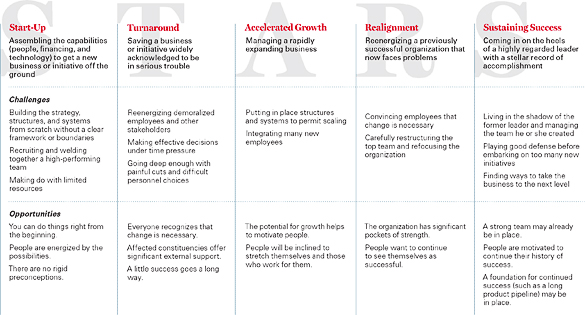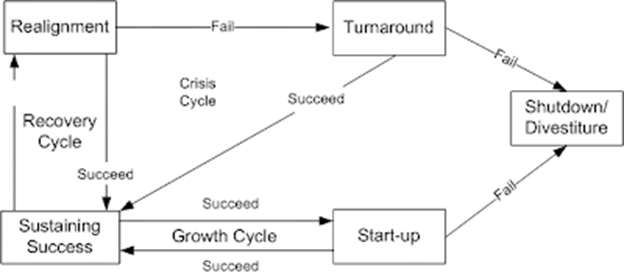We work with a wide variety of clients, some of them are large multinational companies while others are smaller regional players. Despite the size or history of an organization, their businesses can be thought of as a portfolio of the business units, different product lines and geographies where they operate. Each of these, in turn, are at different points in their respective lifecycles and face different challenges specific to the situation that they operate under and may differ greatly from the circumstances that the larger organization faces.
In recognition of this, in addition to our proprietary selection methodology, we incorporate aspects of a framework developed by Michael Watkins and initially presented in his book, “The First 90 Days.”
Mr. Watkin’s framework provides a fairly simple way to discuss the organization’s current situation and, more importantly, identify the key skills and experience that a leader taking over the organization will need to be successful. This is critically important because it reminds us to focus on specific underlying skills needed for the role, rather than, a more generic set of skills associated with the title that we are recruiting for.
Having a way to understand the unique challenges that a particular business unit faces is critical to finding the right fit when recruiting for that entity. The right candidate for a multinational company may be completely different than one for a smaller company. Moreover, the right candidate for a particular job function, even within the same company, may be different depending on the specific demands of the business unit. For example, the skills and experience needed for a Sales Director who is responsible for the company’s well-established product line serving existing clients is going to be different than a Sales Director responsible for launching a completely new product or launching the same product but in a new geography. While many of the underlying skills may be the same, the specific circumstances can have a tremendous impact on what would make the candidate successful. This is a clear example of how job titles do not clearly convey the subtlety of the required skills to be successful.
Similarly, in the case of a Country Manager tasked with bringing an existing product to a new market, we often see that clients have not fully supported the Country Manager with the financial resources necessary to “launch” the product and make it successful because they are so accustomed to how the product responds in markets where it is already well known. Using our proprietary selection model, we help clients see how to adjust the financial and human resources needed to meet these realities so that the Country Manager has the tools needed to be successful.
Using Michael Watkin’s STARS framework also allows us to discuss the types of skills that are of higher priority given the situation and not just focus on more generic skills associated with a particular job title. Using our proprietary selection model combined with the Watkin’s STAR framework helps us build a mutual understanding with our clients for what will make the position successful and the type of candidates that would be the best fit.
Article written by Carl T. Denny, CFR Global Executive Search USA
Photo source: Freepik


